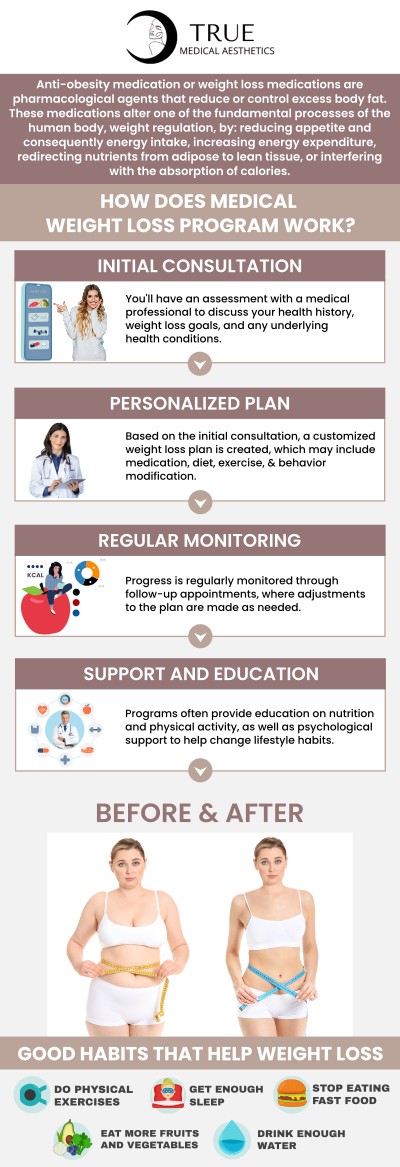What to Expect Before and After Medical Weight Loss
Discover the transformative benefits of medical weight loss treatment. Experience significant support in shedding unwanted pounds, alongside improved glucose control, paving the way for a healthier, more vibrant life. Consult Tristen Durkin, RN, and her team to explore the benefits of medical weight loss for your health needs. For more information, please contact us or schedule an appointment online. We are conveniently located at 50 Avon Meadow Ln, Avon, CT 06001.


Table of Contents:
How long does it take for a medical weight loss program to start working?
What to expect when starting a medical weight loss program?
How long does it take for a medical weight loss plan to suppress appetite?
Are the results of a medical weight loss program sustainable after stopping it?
Ready for a Sustainable Transformation? Effective Medical Weight Loss Program With Tristen Durkin, RN
The timeframe for seeing results from a medical weight loss program varies based on individual factors such as metabolism, adherence to the program, underlying medical conditions, and the specific approach used. However, most people begin to notice early changes within the first few weeks, including increased energy levels, appetite control, and slight reductions in weight.
Typically, individuals following a well-structured medical weight loss plan experience a weight loss rate of 1 to 2 pounds per week, though some may see faster results, especially in the initial phase. Within the first four to six weeks, many patients observe noticeable changes in their body composition, improved digestion, and better overall well-being. However, the most significant transformations occur over the course of three to six months, depending on the consistency of lifestyle changes and medical interventions, such as prescription weight loss medications or supervised meal plans.
Since medical weight loss programs focus on long-term success, the goal is to develop sustainable habits rather than achieve rapid, unsustainable weight loss. Patients who incorporate healthy eating, regular physical activity, and behavioral modifications are more likely to see steady and lasting improvements. Additionally, regular check-ins with healthcare professionals help monitor progress, make necessary adjustments, and prevent plateaus.
While some individuals may experience weight loss sooner than others, commitment and consistency play a key role in how quickly the program starts working. With a personalized and medically supervised approach, results are gradual but sustainable, leading to long-term weight management and improved health outcomes.
Starting a medical weight loss program involves a structured, science-backed approach to achieving sustainable weight loss. Unlike fad diets, these programs focus on long-term success through medical supervision, personalized nutrition plans, exercise guidance, and behavioral modifications.
At your initial consultation, a healthcare provider will assess your medical history, current weight, metabolism, and lifestyle habits to create a customized weight loss plan. Lab tests may be conducted to identify any underlying conditions affecting weight loss, such as hormonal imbalances or metabolic issues. Your provider will then develop a tailored strategy, which may include dietary recommendations, physical activity plans, and, if necessary, FDA-approved weight loss medications to support your progress.
During the first few weeks, you may notice increased energy, improved appetite control, and gradual weight loss. Most individuals lose 1 to 2 pounds per week, but results vary based on individual factors. Regular follow-ups with your provider help track progress, make necessary adjustments, and ensure your plan remains effective.
As the program progresses, expect to make lifestyle changes that promote long-term success, such as adopting healthier eating habits, staying active, and addressing behavioral patterns related to weight gain. Consistency and commitment are key, as medical weight loss focuses on sustainable improvements rather than quick fixes.
Overall, a medical weight loss program provides expert guidance, accountability, and a personalized approach, ensuring safe and effective weight management while improving overall health and well-being.
The time it takes for a medical weight loss plan to suppress appetite depends on several factors, including the approach used, individual metabolism, and adherence to the program. Many people notice appetite control improvements within a few days to a couple of weeks, while others may take longer to experience significant changes.
For those using FDA-approved appetite-suppressing medications, effects can begin within the first few days. These medications work by altering hunger signals in the brain, making it easier to manage cravings and reduce calorie intake. However, results vary based on individual response and proper dosage adjustments by a healthcare provider.
If appetite control is achieved through dietary changes, such as increased protein and fiber intake, stabilization of blood sugar levels, and mindful eating strategies, it may take one to two weeks for the body to adapt. Hydration, sleep, and stress management also play crucial roles in regulating hunger hormones like ghrelin and leptin.
Lifestyle changes, including regular physical activity, further support appetite suppression by improving metabolism and balancing hormone levels. Medical weight loss programs are designed for gradual, sustainable changes, meaning appetite control may not be immediate, but it will improve over time with consistency.
Regular check-ins with a medical professional ensure that appetite-suppressing strategies are effective and adjusted as needed. By following a structured plan, individuals can experience long-term appetite regulation, making weight loss more manageable and sustainable
The sustainability of medical weight loss program results depends on the individual’s commitment to maintaining healthy lifestyle changes after completing the program. While medical weight loss provides structured guidance, appetite control strategies, and sometimes FDA-approved medications, long-term success is determined by continued adherence to proper nutrition, physical activity, and behavioral habits.
For many individuals, weight loss achieved through a medical program can be maintained if they continue following the habits learned during treatment. This includes balanced eating, portion control, regular exercise, and mindful lifestyle choices. Programs often focus on gradual, sustainable weight loss—typically 1 to 2 pounds per week—to help individuals develop long-lasting habits rather than relying on short-term fixes.
However, if an individual reverts to old eating habits, a sedentary lifestyle, or neglects behavioral changes, weight regain is possible. This is why ongoing support and periodic check-ins with a healthcare provider are recommended even after stopping a formal weight loss program. Some patients may also require long-term medical supervision or maintenance treatments to keep their metabolism and appetite in check.
The most effective way to sustain weight loss after stopping a medical weight loss program is to incorporate long-term changes into daily life. Those who stay consistent with healthy lifestyle habits are more likely to maintain their results, prevent weight regain, and continue improving overall health for years to come.
Achieving long-term weight management requires a personalized, medically-guided strategy. At True Medical Aesthetics in Avon, CT, your journey is supervised by Tristen Durkin, RN, and her committed staff who prioritize your holistic health and wellness.
The Medical Weight Loss Program is designed to provide you with the structure and support needed to meet your goals, ensuring all treatments align with your individual needs and desires. This program goes beyond surface-level aesthetics, focusing on helping you not only look your best but also feel your best. True Medical Aesthetics is dedicated to informed, individualized care and offers the convenience of accepting FSA/HSA for this program, including associated fitness and nutritional services (subject to plan specifics and required documentation). Trust Tristen Durkin, RN, and her team to guide you toward a healthier, more confident you.
Discover how medical weight loss program can change your life and open the door to a happier, healthier life. Take charge of your well-being and unlock a future filled with vitality, confidence, and control. For more information, please contact us or schedule an appointment online. We are conveniently located at 50 Avon Meadow Ln, Avon, CT 06001. We serve clients from Avon CT, Simsbury CT, Canton CT, Bloomfield CT, Farmington CT, Burlington CT, and surrounding areas.
Check Out Our 5 Star Reviews


Additional Services You May Need
• Microneedling RF
• Body Sculp Laser Lipo
• Vitamin Injections
• IV Drip Vitamin Therapy
• Non-Surgical Face Lift
• Aquagold Deluxe Facial
• Dermaplaning Facial
• Laser Hair Removal
• Rosacea Treatment
• Tattoo Removal
• Hollywood Carbon Facial
• IPL Pigment Removal
• Laser Vein Removal
• Skin Tightening Laser Facial
• Radiesse Filler
• Chin Sculpt Fat Melting
• Hyperhidrosis Treatment
• PRF Hair Restoration
• PRF Under Eye Injections
• Lip Flip
• Dermal Filler
• Aquagold Deluxe Facial
• Botox
• Holistic Wellness
• Holistic Weight Management Program
• Glass Skin Program
• Breeze
• Dysport
• Emsculpt
• Lip Fillers
• Cheek Fillers
• Chin Fillers
• Jawline Fillers
• PDRN
• Facial Lymphatic Drainage
• IPL Laser Facial
• Erbium Yag Laser Facial
• Red Light Therapy
• Infrared Sauna
• Vitamin D
• Vitamin Complex
• NAD+ IV Therapy

Additional Services You May Need
• Microneedling RF
• Body Sculp Laser Lipo
• Vitamin Injections
• IV Drip Vitamin Therapy
• Non-Surgical Face Lift
• Aquagold Deluxe Facial
• Dermaplaning Facial
• Laser Hair Removal
• Rosacea Treatment
• Tattoo Removal
• Hollywood Carbon Facial
• IPL Pigment Removal
• Laser Vein Removal
• Skin Tightening Laser Facial
• Radiesse Filler
• Chin Sculpt Fat Melting
• Hyperhidrosis Treatment
• PRF Hair Restoration
• PRF Under Eye Injections
• Lip Flip
• Dermal Filler
• Aquagold Deluxe Facial
• Botox
• Holistic Wellness
• Holistic Weight Management Program
• Glass Skin Program
• Breeze
• Dysport
• Emsculpt
• Lip Fillers
• Cheek Fillers
• Chin Fillers
• Jawline Fillers
• PDRN
• Facial Lymphatic Drainage
• IPL Laser Facial
• Erbium Yag Laser Facial
• Red Light Therapy
• Infrared Sauna
• Vitamin D
• Vitamin Complex
• NAD+ IV Therapy








